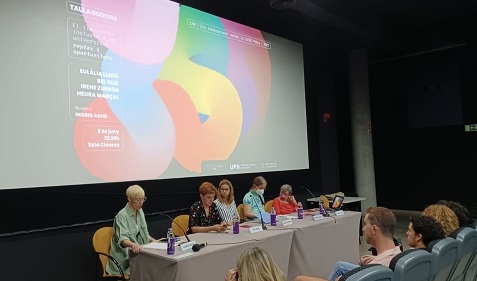Let's debate about the different possibilities of inclusive language

The UAB Observatory for Equality organised an event with four speakers from different backgrounds and disciplines who held a debate about the different options for the use of non-sexist language and how to include the LGBTI perspective.
20/06/2022
On Thursday 9 June at the Sala Cinema, the Observatory organised a round table on inclusive language and the debates and issues surrounding it. The table was made up of four speakers from different disciplines and professional backgrounds who presented some of the most relevant aspects from their respective points of view. For this session, a special focus was placed on including the LGBTI perspective in the language, following on from the implementation of measure 1.2.1. Make a non-sexist and inclusive use of language in all forms and means of communication of the University, of the 4th Gender Equality Plan, and specifically its third operational objective: Revising the Guide for the use of non-sexist language at the UAB from an LGBTIQ perspective.
Esther Zapater, the General Secretary, opened the table thanking the four speakers for their attendance: Eulàlia Lledó, Heura Marçal, Irene Zurrón and Bel Olid. She then gave the floor to Ingrid Agud, lecturer at the Faculty of Education Sciences, who moderated the event.
The first speech was given by Eulàlia Lledó, PhD in Romance Philology, retired professor and author of several guides for the use of non-sexist language. Lledó talked about the importance of naming or the lack of it, as a lack of a name is, to some extent, a lack of recognition. She gave examples of how certain words such as “lideresa”, used by the politician Esperanza Aguirre, or the term “miembra”, used by the former minister of the Ministry of Equality, Bibiana Aído, were criticised and mocked by the media. However, other terms that affected men were introduced into the Real Academia de la Lengua Española without any controversy, such as the term “modisto”, introduced in 1984.
The second intervention was done by Heura Marçal, linguistic advisor and translator at the Language Service of the Universitat Autònoma de Barcelona and author of the Guide for the use of non-sexist language at the UAB and the Ten tips for the use of non-sexist language document. She recommended avoiding references to the gender of people, using collective words or neutral expressions such as el professorat or l’alumnat, or also using the double forms (in feminine and masculine) as a resource for visibility, pointing out, however, that splitting segregates and is binary. For this reason, Marçal focused on the importance of the discourse rather than on the language, that the discourse should have the intention of being inclusive, even if the generic masculine is used.
Thirdly, in the round table was Irene Zurrón, graduate in Catalan Language and Literature with an Extraordinary End-of-Degree ward from the UIB (2013) and lecturer on the Gender Studies Degree. Zurrón pointed out that as language makes us conceive the world, therefore inclusive language is, more than a linguistic preference, an approach to what imaginaries we create when we communicate. When we speak, we are constantly making linguistic choices as well as conscious corrections, therefore, linguistic change is not the same as the corruption of language. Lastly, she pointed out that in the approach of an inclusive language, it would also be necessary to include other axes such as anti-racism.
The fourth and last speech was given by Bel Olid, a graduate in Translation and Interpreting from the UAB. They have also taught at this university and are currently a writer and translator, as well as an advocate of the use of gender-neutral language in Catalan. Olid stressed the importance of giving a voice to non-binary people when dealing with these matters. One of the problems they pointed out was that people do not think that non-binary people can take the floor, and they claimed that they are real and tangible. The use of gender-neutral forms implies an acknowledgment of the non-binary group, which is still in a situation where its existence is questioned. As an example, they proposed using the -i termination in Catalan to include non-binary people, such as in words like totis, or in Spanish, todes. Lastly, they highlighted that the university is an ideal space for reflection, and it is necessary to create complicity between people who need to be acknowledged and people who want to be acknowledged.
This information is related to the following SDG
Reduced inequalities
Gender equality
Quality education